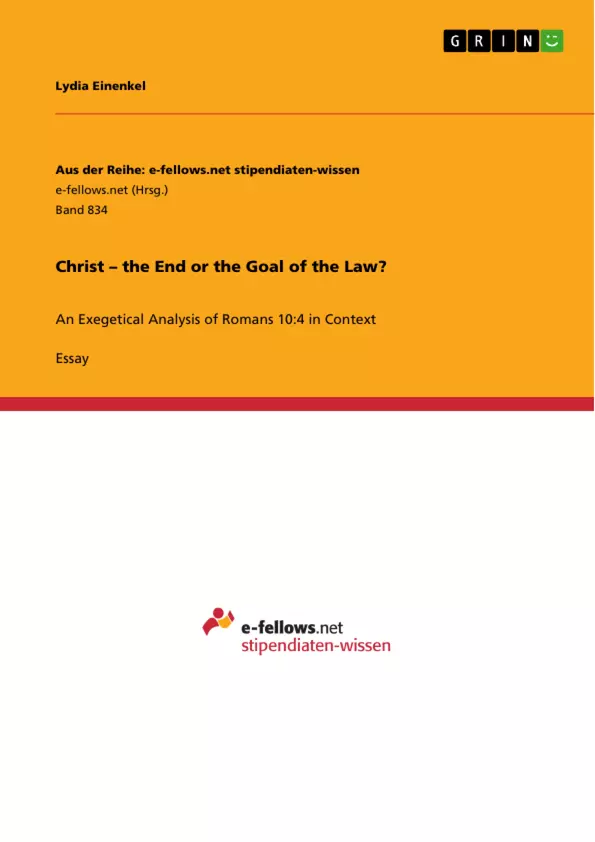Dieses Essay behandelt im Detail den Halbvers 10:4a des Briefes an die Römer von Paulus. Diese Bibelstelle, die traditionell mit „Christus ist das Ende des Gesetzes“ übersetzt wurde, wird hier im neuen Licht betrachtet und einer ausgiebigen Textanalyse unterworfen. Mit dem Fokus auf philologische Besonderheiten unter Einbindung des großen textuellen Kontexts entwickelt die Autorin eine Alternativbedeutung von Röm 10:4a. Sie legt dar, dass Christus keinesfalls das Gesetz beendet und für nichtig erklärt, sondern dass Christus vielmehr das Ziel ist, auf welches das Gesetz hinausläuft. So wird die negative Konnotation des Gesetzes, die in der lutherischen Theologie oftmals vorzufinden ist, umgewandelt in eine positive Betrachtung der Thora. Gleichsam wird dargelegt, dass Gott auch nach dem Kommen Jesu Christu treu zu seinem Versprechen steht und den Bund mit Israel nicht aufgehoben, sondern erweitert hat.
Inhaltsverzeichnis (Table of Contents)
- Introduction
- Structural place
- Topic
- Concerns, questions, emphasis
- Analysis
- Language and key words
- Contextual analysis
- Romans 10:4A WITHIN Romans 10:4
- Romans 10:4A WITHIN Romans 10:1-4
- Romans 10:4A WITHIN Romans 1-16
- Conclusion
- Bibliography
Zielsetzung und Themenschwerpunkte (Objectives and Key Themes)
This paper aims to provide a detailed exegetical analysis of Romans 10:4, focusing on the statement "For Christ is the end of the law," within the broader context of the Epistle to the Romans. It examines the verse's meaning and its relationship to the overarching themes of Jewish-Gentile relations, righteousness, faith, and the law in Paul's writings.
- The role of the law in relation to Christ's role in salvation
- The meaning and implications of "Christ is the end of the law"
- The concept of justification and its significance for Jews and Gentiles
- The understanding of the law in Pauline thought
- The relationship between faith and works in Paul's theology
Zusammenfassung der Kapitel (Chapter Summaries)
- Introduction: This chapter introduces the focus of the paper, which is the verse "Christ is the end of the law" in Romans 10:4, emphasizing the importance of analyzing this statement within its context. It also acknowledges the theological history of this verse, particularly within Lutheran theology, and sets the stage for a detailed analysis.
- Structural Place: This chapter examines the placement of Romans 10:4 within the Epistle to the Romans, emphasizing its location within the larger section discussing Israel's position in God's plan of salvation. It outlines the specific context of the verse within Romans 10:1-4 and its connection to the preceding verses.
- Topic: This chapter focuses on the central theme of the verse, which is the relationship between Christ and the law. It explores the question of whether Christ is a contradiction to the law or a fulfillment of it, setting the stage for the detailed analysis that follows.
- Concerns, Questions, Emphasis: This chapter explores various questions surrounding the verse, such as the meaning of "telos nomou" (end of the law), the nature of the law for Paul, and the significance of this verse in relation to other Pauline teachings on law and faith.
- Analysis: This chapter delves into a detailed analysis of the verse, examining the language and key words. It discusses the meaning of "nomos" (law) and "telos" (end or goal), highlighting the importance of translating these words accurately for a proper interpretation of the verse.
Schlüsselwörter (Keywords)
This paper focuses on key concepts such as the law (nomos), Christ, justification, faith, righteousness, and the relationship between Jews and Gentiles. It explores the meaning of the verse "For Christ is the end of the law" in Romans 10:4 in relation to the broader themes of Paul's theology and the interpretation of his writings.
Frequently Asked Questions
What does "Christ is the end of the law" mean in Romans 10:4?
The paper argues that "end" (telos) should be understood as "goal" or "fulfillment" rather than termination, suggesting Christ is the destination the law points toward.
How does this interpretation differ from traditional Lutheran theology?
Traditional Lutheran views often see a negative contrast between law and gospel; this essay proposes a more positive view of the Torah as being expanded and fulfilled through Christ.
What is the significance of the term "telos nomou"?
The analysis focuses on the philological nuances of these Greek words to show that Paul viewed the law as a continuing part of God's plan, now accessible through faith in Christ.
Does Paul believe God's covenant with Israel is over?
No, the essay states that God remains faithful to His promise; the covenant is not abolished but extended to include Gentiles through Christ.
What is the relationship between faith and righteousness in this context?
Righteousness is achieved through faith in Christ, who fulfills the law's intent, making salvation available to everyone who believes, whether Jew or Gentile.
- Quote paper
- M.Phil Lydia Einenkel (Author), 2011, Christ – the End or the Goal of the Law?, Munich, GRIN Verlag, https://www.grin.com/document/262929



